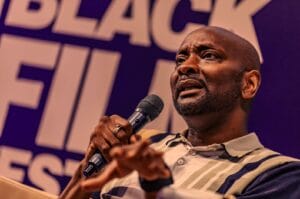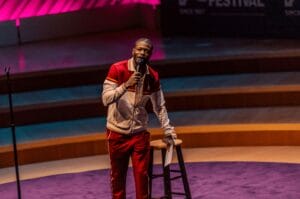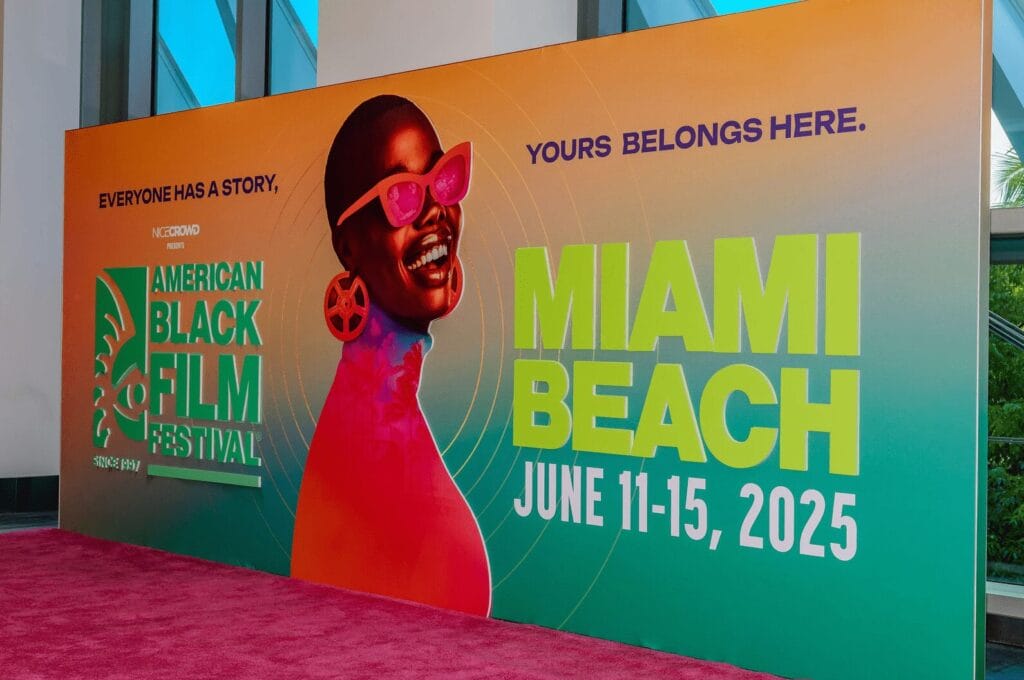By Richard Fowler, Contributing Writer
At a time of severe societal change, creators, filmmakers, actors, producers, and film lovers gathered in Miami Beach to fight forward through storylines that both showcase and shape a culture long seated at the cornerstone of American identity—global Blackness.
Now in its 29th year, the American Black Film Festival once again reminded the world that everyone has a story. From its signature White Party to the ever-popular Comedy Night hosted by DC Young Fly, ABFF upheld its reputation as a joyful, powerful collision of talent, creativity, and unapologetic Black storytelling. But behind the velvet ropes and screening rooms, this year felt more like a cultural homecoming, where overlooked narratives took center stage and where GLAAD proudly stood shoulder to shoulder with creators rewriting the rules of visibility.
As part of this year’s programming, GLAAD partnered with ABFF to co-host “Reel & Radiant: A Mixer for Black LGBTQ+ Creatives and Their Allies”, a curated track of conversations, screenings, and celebrations spotlighting films and filmmakers telling stories at the intersection of Black and LGBTQIA identity. In a media landscape that still struggles to see Blackness and queerness as coexisting truths, Reel & Radiant made space for creators who live that duality every day—and are turning it into some of the most electric and urgent work onscreen.
This partnership arrived just one week before the world premiere of Noah’s Arc: The Movie on Paramount+. The reboot of the groundbreaking 2000s series was a full-circle moment for Black queer visibility on television. ABFF and GLAAD welcomed creator Patrik-Ian Polk to Miami for a special conversation that reminded us just how revolutionary the original show was—and how much room we still have to grow. Over nearly two decades, Noah’s Arc has grown from cult hit to cultural canon. It’s not just a show—it’s a mirror, a blueprint, and a lifeline for a generation that rarely saw themselves in love, in friendship, or in joy.

ABFF 2025 also made room for fresh narratives redefining Black storytelling in real time. One standout moment came courtesy of Mara Brock Akil, whose Netflix series Forever offers a moving portrait of Black teenage love and the families that nurture it. While the mainstream often reduces Black boyhood to trauma or toughness, Forever takes a bold leap by including a character living with ADHD. It’s a subtle but significant reminder that representation isn’t just about who’s in the frame, but what parts of our humanity we’re allowed to show.
Another highlight: a stunning reunion marking the 20th anniversary of Love Jones. Festival Ambassadors Nia Long and Larenz Tate sat down for an intimate conversation about the film that defined a generation of poetic Black romance. Love Jones wasn’t just a classic, it was a turning point. And hearing Long reflect on her first major film role added emotional depth to an already poignant celebration.

Beyond screenings and spotlights, GLAAD used its presence at ABFF to convene a working session with Black creators focused on the representation of Black people living with HIV/AIDS. The conversation wasn’t about performative inclusion—it was about storytelling as a tool for healing, de-stigmatization, and structural change. We know that how stories are told can shape policy, public health, and perception. And in a moment when misinformation and silence remain dangerous, this kind of convening felt both urgent and necessary.
There’s something sacred about ABFF. Maybe it’s the way it balances legacy with innovation. Maybe it’s the sunlight and sea breeze reminding us that joy is a radical act. Or maybe it’s the simple power of gathering—of sitting in rooms full of Black people who know the stakes and keep choosing to create anyway.
For GLAAD, this year’s festival wasn’t just a collaboration. It was a confirmation: that the future of storytelling is intersectional, it’s Black, it’s queer—and it’s already here.













